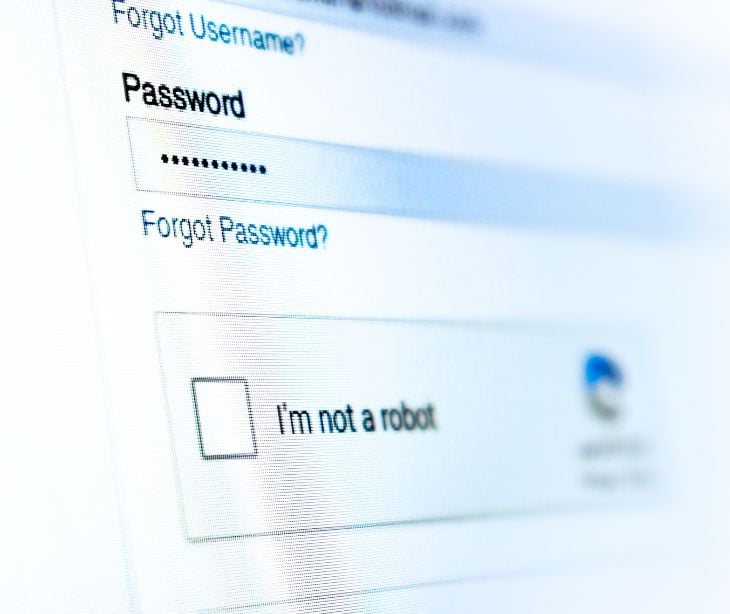
Completely Automated Public Turing test to tell Computers and Humans (CAPTCHA) is a security feature used on websites to determine whether the user is a human or a computer program attempting to automate tasks, possibly for malicious purposes like spamming or hacking.
How do CAPTHCAs work?
CAPTCHAs typically present users with challenges that are easy for humans to solve but difficult for automated scripts or bots. These challenges can include distorted text, image recognition tasks, or puzzle-solving exercises.
The specific mechanism varies depending on the type of CAPTCHA being used, but the general process involves the following steps:
- Presentation: When users attempt to access a website or perform a certain action (such as submitting a form), they are presented with a CAPTCHA challenge.
- Challenge: The CAPTCHA challenge may involve different tasks, such as identifying distorted text characters, selecting certain images from a grid, solving mathematical equations, or completing puzzles. These tasks are designed to be easily solvable by humans but difficult for automated bots to perform accurately.
- Response: The user responds to the challenge by completing the required task. For example, they might type the characters they see in a distorted image or select the appropriate images from a grid.
- Verification: Once the user submits their response, the website verifies whether it is correct. If the response matches the expected answer, the user can access the desired service or action.
By completing the CAPTCHA, users prove that they are human and gain access to the website or service.
See also:
- Handling PHI on hospital landing pages
- Can you send PHI via Gmail?
- What is cybersecurity in healthcare?
Types of CAPTCHAs
There are several types of CAPTCHAs, each employing different methods to distinguish humans from bots. Here are some common types:
- Text-based CAPTCHA: Users are presented with distorted text characters and must type the characters they see into a text box. This type of CAPTCHA relies on the ability of humans to recognize and interpret distorted text, which can be challenging for automated bots.
- Image-based CAPTCHA: Instead of distorted text, users are presented with images and asked to perform a task related to them, such as selecting all images that contain a certain object or verifying the content of an image. This type of CAPTCHA is designed to leverage humans' superior visual recognition abilities.
- Checkbox CAPTCHA: Users are presented with a checkbox that they must click to confirm that they are not robots. In some cases, users may be required to complete an additional challenge if the checkbox alone is not sufficient to verify their humanity.
- Audio CAPTCHA: Users are presented with an audio recording containing a series of spoken characters or numbers. They are required to listen to the recording and type the characters they hear into a text box. This type of CAPTCHA is used to accommodate users who may have difficulty with visual challenges.
- Math CAPTCHA: Users are presented with a simple mathematical equation, such as addition or subtraction, and are required to solve it to prove their humanity. This type of CAPTCHA relies on humans' ability to perform basic arithmetic calculations.
- reCAPTCHA: Developed by Google, reCAPTCHA is a more advanced form of CAPTCHA that uses a combination of techniques, including image recognition and machine learning, to distinguish humans from bots. It often presents users with a checkbox to confirm their humanity but may also include additional challenges, such as image-based tasks.
Are bots better than humans?
It appears that bots are superior to humans in resolving CAPTCHAs. Researchers at the University of California tested 1,400 individuals on multiple CAPTCHA formats, including image recognition, puzzle sliders, and distorted text. Bots were found to be more proficient and quicker in solving the CAPTCHAs.
See also: HIPAA Compliant Email: The Definitive Guide
FAQs
Can CAPTCHAs be bypassed by bots?
While CAPTCHAs are designed to be difficult for bots to solve, some advanced bots and automated scripts may be able to bypass certain types of CAPTCHA challenges. Regularly updating and monitoring your CAPTCHA solution can help mitigate this risk.
Are there privacy concerns associated with CAPTCHAs?
Some users may have privacy concerns about CAPTCHA solutions that collect personal data or track user behavior. It's important to choose CAPTCHA solutions that prioritize user privacy and comply with relevant data protection regulations.
Can CAPTCHAs be solved by artificial intelligence?
Some advanced AI algorithms, particularly those based on machine learning, may be capable of solving certain types of CAPTCHA challenges. However, CAPTCHA solutions that regularly update and evolve their challenges can make it more difficult for AI-based approaches to succeed.
Subscribe to Paubox Weekly
Every Friday we'll bring you the most important news from Paubox. Our aim is to make you smarter, faster.




